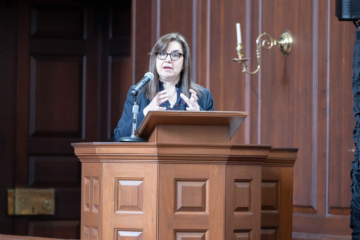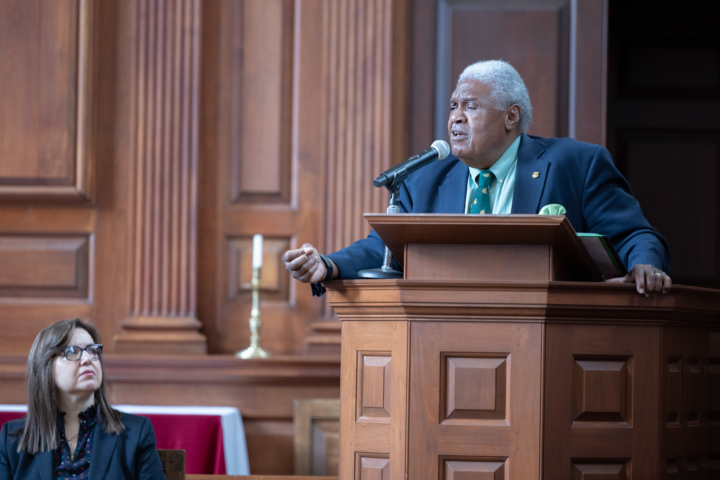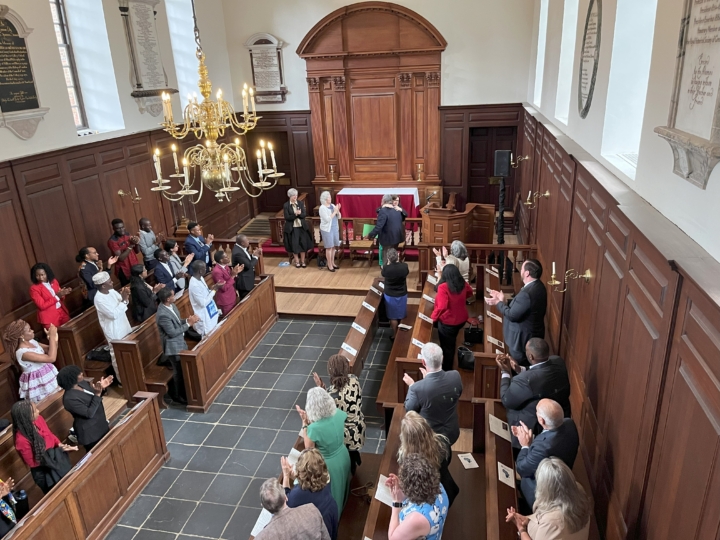On June 23, 2023, William & Mary welcomed 25 of Africa’s brightest, emerging civic leaders for two and a half weeks of leadership training, public policy seminars, mentorship and collaboration with local faculty, civic and business leaders and community members. They are embarking on a six-week Leadership Program of the Mandela Washington Fellowship for Young African Leaders, a program of the U.S. Department of State’s Bureau of Educational and Cultural Affairs, with International Research and Exchanges Board as program administrator.
This is the ninth year that William & Mary and its partners in the Presidential Precinct have been selected as hosts for the Mandela Washington Fellowship. The Reves Center for International Studies spearheads the William & Mary component of the program.
The fellows, selected through a rigorous and competitive application process, are between the ages of 25 and 35 and have established records of accomplishment in promoting innovation and positive change in their organizations, institutions, communities and countries.
The 2023 fellows at William & Mary represent 17 countries in Sub-Saharan Africa and are part of a larger cohort of 700 fellows representing 49 countries, hosted at 28 educational institutions across the United States. Sylvia Mitterndorfer, director of the Global Education Office and director of global partnerships at the Reves Center, serves as academic site lead for William & Mary and draws on expertise across the university and within the Williamsburg area.
The fellows will participate in workshops and individual coaching sessions that range from leadership and wellness to managing nongovernmental organizations and developing public-private partnerships. Their time at William & Mary will also include exploring the cultural and recreational opportunities in the area, such as visits to Colonial Williamsburg and experiencing Williamsburg’s Fourth of July celebrations.
They will then head to the other Presidential Precinct sites — James Madison’s Montpelier, James Monroe’s Highland (where William & Mary Research Professor Sara Bon-Harper serves as site lead), and the University of Virginia — culminating in a multi-day summit of all 700 fellows in Washington, D.C.
Orientations and introductions
The fellows began their day at the Reves Center with Teresa Longo, associate provost for international affairs and executive director of the Reves Center.
“At Reves, we work to bring the international dimension to our university’s priorities by fostering intellectual openness and multi-cultural engagement. We work to send our students out across the world to study and to research. We work to bring people from across the world to our campus,” Longo explained.
Addressing the fellows directly, she continued: “You are the brilliant minds in this room. I hope that what you do at William & Mary sets you on the path for a rich, productive experience overall. I hope your experience this month ripples out and lasts a lifetime. We are honored to know you, learn from you, and work with you.”
After meeting with the fellows and learning about their projects and hopes for the program, Longo remarked on the special nature of this year’s group.
“To a person, the fellows have all emphasized their commitment to human rights and access to justice. And they have emphasized a dedication to youth empowerment,” she recounted.
“They are the next generation of leaders, and they are already working to empower the generation that will follow them. There is power in what each of them brings to this initiative and there is extraordinary beauty in what they bring together.”
Poetry and statecraft
The fellows had arrived in Williamsburg mid-week, settling into their lodging at One Tribe Place, getting oriented to their surroundings, buying groceries and other housekeeping items. At 11 a.m. on Friday, during a brief break in the morning’s intermittent rain showers, they walked as a group from the Reves Center to the Wren Building for the official launch of the 2023 Leadership Institute.
Despite the clouds outside, Wren Chapel was bright with hope and promise and enthusiasm. The audience members were a distinguished group — Barbara L. Johnson J.D. ’84, Vice Rector of the Board of Visitors; James B. Murray, Jr. J.D. ’74, LL.D. ’00, founder of the Presidential Precinct and former William & Mary Rector; Lisa E. Roday, former member of the Board of Visitors; local leaders including Cliff Fleet ’91, M.A. ’93, J.D. ’95, M.B.A. ’95, CEO of Colonial Williamsburg; former mayor Jeanne Zeidler; supporters of the program, faculty and administrators.

(Photo by Drew Precious.)
In her welcome, Provost Peggy Agouris explained how hosting the Mandela Fellows through the partnership with the Presidential Precinct is very much part of the university’s mission.
“We are working to deepen our global connections. International connections are in this university’s DNA, and our vision is to convene great hearts and great minds to understand and change the world for the better,” she said. “As a university, we are thinking about what it means to serve the local and global communities in the 21st century.”
Agouris also spoke of her hope for the fellows to continue the connections made during their visit. “My invitation to you, each one of you, is to think with us about opportunities for collaboration and partnership.”
She then introduced Judge John Charles Thomas, the first Black justice appointed to the Supreme Court of Virginia and a former longtime member of the William & Mary Board of Visitors, to deliver the keynote address. The jurist, who is a gifted poet and orator, electrified the room as he took the podium. Thomas began by addressing the large distance the fellows had traveled – both physically and metaphorically – to be in Williamsburg.
“As I look at the 2023 young African leaders, I know just how magnificent this journey has been for you to come from all over Africa, to come together in this place where you all can meet each other and learn from each other and to study,” he began.
“And as I thought about what I might say here today, I was overwhelmed by the juxtaposition of it all. This word means putting things beside each other so that you can discern either the sameness or the difference between them; compare and contrast. Juxtapositions run through all of what we’re doing here today.”
Thomas noted that sometimes people make the mistake of thinking of Africa as one monolithic country, rather than what it is: a continent made up of many different nations, regions, languages and interests. And he acknowledged that the fellows hailed from countries across the continent.
“As I read your backgrounds and thought about what you’ve done, I can see a thread that runs through all of you, even though you were in different places. And it seems to me that you probably thought as you were living in your nation, doing what you were doing, fighting for human rights, fighting for gender equality, fighting for youth empowerment, fighting for getting out the vote, fighting for democracy, the problem is often that you were all alone,” he said.

“But now that we have you sitting beside each other, you can see that you weren’t alone. You can see that there were others who were just like you, worried about things just like you have worried about in a whole other place, thousands of miles away, doing the same thing. Doesn’t that tell us that there are currents that run through human nature, that run through human rights, that run through our spirits, that are unified powerfully, no matter where you come from and no matter what language you speak?”
“And so even within the corps of the leaders from Africa, the power of juxtaposition is speaking to me because it teaches us so much about what we might become when we think of us as humans who put ourselves side by side and recognize the likeness and even the differences that we can talk about and learn from.”
Thomas also noted that these young leaders were already accomplished in their fields — “If you had not already done something powerful, you wouldn’t be here now to learn a little bit more,” he said — but that with the foundation they were going to build in their program, they would be able to be even more effective.
And then, as a poet, statesman and leader, Thomas issued a mandate to the fellows: “I call on you now in the spirit of the poets to be builders of ships of stage, to be builders of nations.”
Understanding the power of poetry, Thomas recited from memory Henry Wadsworth Longfellow’s “The Building of the Ship,” a poem written in 1849 that inspired both Abraham Lincoln in the years before the Civil War and later Winston Churchill while battling the Nazis in 1941.
His powerful baritone voice filled the chamber and riveted the audience, with the stirring last lines of the poem:
“Thou, too, sail on, O Ship of State!
Sail on, O Union, strong and great!
Humanity with all its fears,
With all the hopes of future years,
Is hanging breathless on thy fate!
We know what Master laid thy keel,
What Workmen wrought thy ribs of steel,
Who made each mast, and sail, and rope,
What anvils rang, what hammers beat,
In what a forge and what a heat
Were shaped the anchors of thy hope!
Fear not each sudden sound and shock,
‘Tis of the wave and not the rock;
‘Tis but the flapping of the sail,
And not a rent made by the gale!
In spite of rock and tempest’s roar,
In spite of false lights on the shore,
Sail on, nor fear to breast the sea!
Our hearts, our hopes, are all with thee,
Our hearts, our hopes, our prayers, our tears,
Our faith triumphant o’er our fears,
Are all with thee, — are all with thee!”
With those words still reverberating in the chapel, Judge Thomas looked at the 25 fellows sitting in rapt attention and left no doubt of his mandate for them:
“Members of the Young African Leaders Class of 2023, we must depend on you. You are our hope for changing the world for the better. God bless you.”

2023 Mandela Washington Fellows at the Presidential Precinct
Botswana: Njiramanda Mbewe, Baboloki Semele
Cameroon: Viviane Tathi
Democratic Republic of the Congo: Laetitia Nyemba
Djibouti: Hussein Osman Aden
Ethiopia: Abdulnasir Adem, Bereket Erecha
Ghana: David Nii Doodo Larbi
Kenya: Judy Cheserek
Kingdom of eSwatini: Zulu Abriel Lungelo
Mauritania: Aiche Sy
Mauritius: Darshinee Choytah, Preetima Moteea
Mozambique: Teles e Cunha
Nigeria: Abiola Nurudeen Durodola, Mohammed Lawal
Senegal: Papa Sanou Faye
South Africa: Cassandra Dorasamy, Busisiwe Nxumalo
South Sudan: Anibiko Martin Koosa
Republic of Tanzania: Diana Nsekela
Zimbabwe: Sandiso Dladla, Joseph Makuni, Wadzanai Adeline (Adel) Masunda, Courteney Mukoyi
The Mandela Washington Fellowship for Young African Leaders is the founding flagship program of the Young African Leaders Initiative. The fellows, between the ages of 25 and 35, are accomplished leaders and have established records of promoting innovation and positive impact in their communities and countries. Each year, fellows participate in six-week leadership institutes, studying business, civic engagement, or public management at U.S. colleges or universities. During their time on campus, fellows connect with Americans and local U.S. communities through community service and other cultural experiences. Since 2014, the U.S. Department of State has supported nearly 5,800 Mandela Washington Fellows from across sub-Saharan Africa to develop their leadership skills and foster connections and collaboration with U.S. professionals.
The Presidential Precinct is a Virginia-based nonprofit organization that empowers and inspires emerging global leaders by providing leadership tools, training and a virtual network for continuing education and collaboration. Their work is made possible by the world-class expertise of their four-member consortium, consisting of two premier universities — the University of Virginia and William & Mary — and two historic sites — James Madison’s Montpelier and James Monroe’s Highland. Close relationships with Thomas Jefferson’s Monticello, the U.S. Department of State, and communities around Virginia help to complete a strategic network for empowering communities globally.
The Reves Center and the Presidential Precinct partner on other programs throughout the year, including the International Visitor Leadership Program, the U.S. Department of State’s premier professional exchange program. Through short-term visits to the United States, current and emerging foreign leaders in a variety of fields experience this country firsthand and cultivate lasting relationships with their American counterparts. Professional meetings reflect the participants’ professional interests and support the foreign policy goals of the United States.

